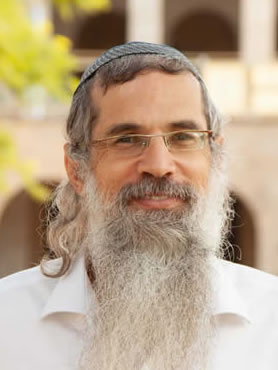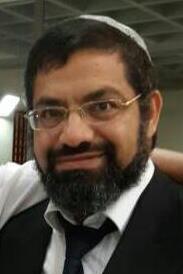And I Have Come Down To Rescue It And To Bring It Up
By: Rav Yitzchak Stern
The greatness of our Rav and teacher HaRav Chaim Druckman ZTZ"L was not centered on voluminous and innovative insights in the Torah, nor on original Halachic rulings. His greatness was his self-sacrifice for the generation. And as much as he invested in strengthening the students of the yeshiva, he placed even greater importance in elevating the young of the flock, the members of the B'nei Akiva youth movement and their contemporaries.
Our teacher, of blessed memory, did not consider it beneath his dignity to give shiurim to boisterous, sweaty youth, to sit in board meetings of B'nei Akiva, and to deal with the minute details of the youth movement. He also did not wear the elegant attire of a great Rabbi, but sufficed with a Josef Kauffman fleece sweater, and explained this by saying that he wanted to be connected with the young generation.
Apparently HaRav Druckman ZTZ"L learned this principle (also) from the verses in our parsha (Shemot 3:7-8):
"And HaShem said, I have seen the poverty of my nation in Egypt, and I have heard their cries because of their oppressors, as I knew their sufferings. And I have come down to rescue it from the hand of Egypt and to bring it up from that land…"
Our Rabbis explain that here HaShem showed a directive and an example, that in order to rescue Am Israel, one must be willing to sacrifice himself, physically and spiritually, even when one "descends" from his personal level. HaShem Himself 'lowered' His Shechinah and 'descended' from His place of greatness, in order to save Am Israel and to raise them from their depths. Rabbenu Chaim ben Attar, the Ohr HaChayim, expresses this as follows:
"And I will go down to rescue it and to bring it up, etc." The reason He said "I will go down" is that, commensurate with the infiniteness of the the greatness of HaShem who is above all, it is beneath His honor to do all He did, (namely) that His words reach a such villainous man as Pharaoh, and that His words will be said (to Pharaoh) in His name… regarding this HaShem said "and I have come down" – He consented to what appears as lowering His honor in order to rescue Israel, as He said "to rescue it."
HaRav Issachar Shlomo Teichtal ZTZ"L HI"D, the author of the book Em HaBanim Semeicha eloquently expressed the message which should be learned from this by the Torah leaders and the educators of the generation (Mishnat Sachir, Parshat Pinchas):
And certainly it is comfortable for a Torah scholar to associate with a Torah scholar like himself, and even if one is greater than his colleague, nevertheless they are both similar regarding their comprehension of the Torah. In contrast, it is difficult for a Talmid Chacham to connect with an Am Ha'aretz (one who is ignorant of the Torah) because, figuratively, a high mountain separates between them. Therefore, in a city filled with scholars and scribes, it is convenient for a Talmid Chacham to accept their behavior and to become their leader, but to lead the masses – this is very difficult for him, as he cannot bring himself down to them.
And in truth, it is a higher priority for him to integrate himself with them, and with the young children who are still far from understanding the Torah, than to associate with Talmidei Chachamim. For they are already connected to the Torah and they will find their path to the Torah and the fear of G-d if they will search for it in the books. But these young children, as well as the masses who are ignorant of the books, from where will they know HaShem?! Therefore it is a double Mitzvah and obligation for the leader to integrate with them, to draw them to Torah.
So we saw regarding HaShem: When He revealed Himself to them at Sinai, it is written (Shemot 19:20) "And HaShem descended on Mount Sinai" meaning that He descended from His high level to His lower level… to show that (the Torah scholar) must break from his level and lower himself to the level of the nation, as HaShem did, and thus he will be doing the will of his Creator.
Additionally, our teacher ZTZ"L exerted the strength of his body and soul on instilling the love of Eretz Israel, and on the wholeness and the building of the Land. Indeed, we learn this as well from the aforementioned verse (Shemot 3:8):
"And I have come down to rescue it from the hand of Egypt and to bring it up from that land to a good and spacious land, to a land flowing with milk and honey, to the place of the Canaanite and the Hittite and the Amorite and the Perrizite and the Hivite and the Jebusite."
The commentators have explained at length why HaShem had to emphasize to Israel that He will bring them up to a good and spacious land, when presumably the very fact they were going to leave Egypt would have been enough. And they explained that here HaShem taught us that the only place Am Israel can flourish spiritually is in Eretz Israel.
For instance, Rabbenu Behayeii Ben Asher, the student of the Rashba writes: Why does the Torah need to go to such lengths to extol the trees and the stones? Additionally, why was this praising necessary at this time? Since the nation was enduring suffering at the hands of oppressive masters, wouldn't the joy and rejoicing at the tiding of redemption, even if it were destined to go to a desert land, be sufficient for it?
But the point is: all these praises are said about the Torah. "A good and spacious land" – a land of good and spaciousness – as it says (Mishlei 4:2) "Since I gave you a good instruction, do not abandon my Torah."
"Spacious" – as it says (Tehillim 119:96): "Your commandments are very expansive." Also (Iyov 11:9): "and broader than the sea." "A land flowing with milk and honey" – as it says (Shir HaShirim 4:11): "Honey and milk under your tongue"… that the essence of this Torah is there (in Eretz Israel). And the Sages elaborated: "And the gold of that land is good" (Bereshis 2:12) – there is no Torah like the Torah of Eretz Israel, and there is no wisdom like the wisdom of Eretz Israel.
And Rabbi Moshe Alsheich wrote (on Shemot 3:8): Eretz Israel is (the land) appropriate for receiving holiness, through its wide holy "pipes", since the gate to Heaven is there, and this is (the meaning of) "good and spacious."
On the same verse wrote the Natziv of Volozin (HaEmek Davar): "And to bring it up" – and afterwards it (the nation) will ascend to a good and spacious land, and there they will be wealthy in wisdom and spiritual height.
This is the "winning" combination: Am Israel, in Eretz Israel, living according to the Torah of Israel. Or in the words of HaRav Zvi Yehuda Kook ZTZ"L: The revival of the nation, in its land, according to its Torah."
These three fundamental pillars were the essence of the enlightening life of our teacher and Rabbi, HaRav Chaim Meir Drukman ZTZ"L, and he dedicated to them all his physical and spiritual powers. Our task is to continue his mission: to spread Torah to the flocks, to go down to the nation in order to rescue it physically and to raise it spiritually.
May we merit to succeed in this mission!
Shiur ID: 9484
Do you have a comment or question on the shiur?
Comment below and we'll join the discussion
Add your comments:


.jpg)


 (1).jpg)

